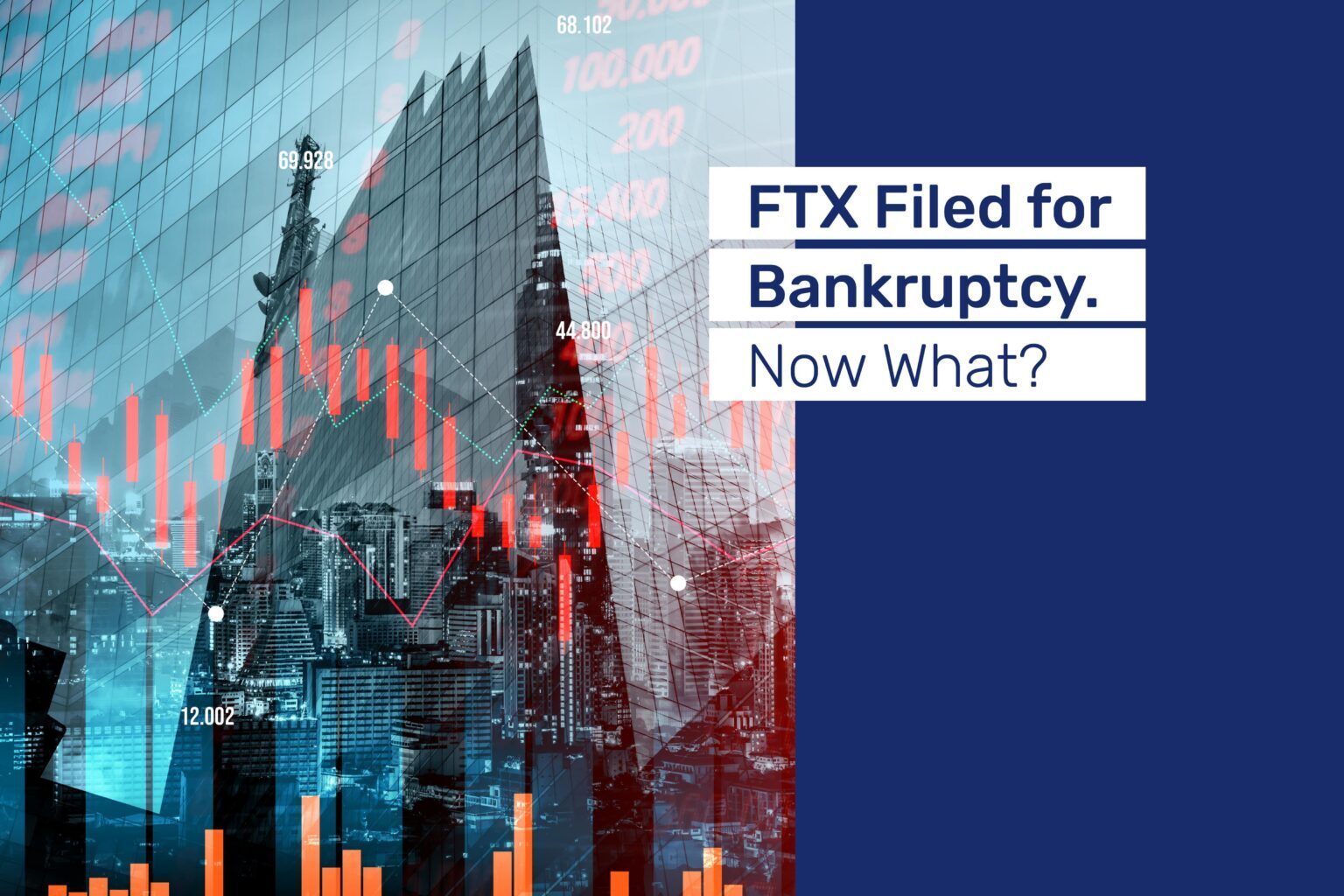Unpacking the impact on US customers and what comes next
Over the past week, FTX Trading, Ltd. (FTX Trading), along with its related trading firm Alameda Research, LLC, found itself in a liquidity crunch.
On November 10, 2022, the Securities Commission of The Bahamas took action to freeze FTX’s assets, suspend its registration in that jurisdiction, and apply to the Supreme Court of the Bahamas for the appointment of a liquidator under Bahamian law.
The next morning, on November 11, 2022, FTX Trading, along with 134 related entities (FTX Group) filed voluntary bankruptcy petitions in US bankruptcy court for the District of Delaware.
The petitions in each case are all essentially the same, referencing a few key pieces of information:
- Funds will be available for distribution to unsecured creditors
- Estimated creditors exceed 100,000
- Estimated assets range from $10 – $50 billion
- Estimated liabilities range from $10 – $50 billion
- An omnibus statement from Sam Bankman-Fried as the sole authorized owner, director, officer, and manager transferring control to John Ray as CEO of all of the companies and appointing certain board members
The petitions also included an attachment identifying the ownership of the various bankrupt entities. Based on the attachment, it appears that all of the entities within the FTX Group rolled up into three primary entities:
- FTX Trading, Ltd. – the holding company for most of FTX Group’s non-US operations
- Alameda Research, LLC—the proprietary trading arm of FTX Group
- West Realm Shires, Inc.—the holding company for FTX Group’s US operations, which includes West Realm Shires Services, Inc.
It does not appear that West Realm Shires, Inc., filed for bankruptcy but its subsidiary West Realm Shires Services, Inc., which operates FTX.us, did. FTX.us’s derivatives trading platform is operated by FTX US Derivatives, LLC, and also did not file for bankruptcy – it is a separate subsidiary of West Realm Shires.
On November 10, 2022, prior to the bankruptcy filing, FTX.us announced that it may halt trading on its platform. After the bankruptcy filing, withdrawals from FTX.us were halted briefly but later resumed. The notice about a possible trading halt is still on the website and there have been other statements that FTX.us will halt all activity as part of the bankruptcy.
Late on November 11, 2022, crypto units began flowing out of FTX’s various wallets in an apparent hack of the platform. It is unclear what impact these possible thefts will have on the pending bankruptcy.
There is a lot of speculation as to how all this came to be and there will be plenty of time to investigate, understand, and digest what went wrong. But all of this gives rise to a more immediate question that we can only begin to answer based on the very limited information available.
What happens next?
It is really unclear. Given the novelty of cryptocurrency exchanges as a type of business, there are bound to be a number of unanswered legal questions that arise as the court begins to tackle the administration of the joint bankruptcy.
The first question is whether all of the bankruptcy filings will move forward in the joint proceeding.
US bankruptcy protection generally requires some nexus to the US. Although Alameda Research and West Realm Shires Services are US entities, FTX Trading and a number of the entities involved are not. An initial legal question will be whether those entities have sufficient ties to the US to be afforded protection under US bankruptcy law. It is well-known that FTX Trading (FTX.com) operated outside the purview of US regulators and was not accessible to US individuals. Attempts by FTX Trading to now avail itself of US law may fall short.
The inclusion of all of the related entities in the joint filings, however, does support the conclusion that the business relationships between these entities were not well-defined or documented, meaning the consolidated bankruptcy proceeding may be necessary to untangle the web of relationships, agreements, and commingling between all of the entities so creditors can receive the best outcome.
One important aspect to note is that the petitions are seeking relief under Chapter 11 of the bankruptcy code. Chapter 11 is designed to permit businesses to restructure or reorganize their debts while continuing to operate. Chapter 7 is used when a debtor is going to cease operations and liquidate all of its assets. The availability of reorganization under US law may be part of the reason FTX filed bankruptcy for all its entities in the US. Under Bahamian law, there is no legal framework to reorganize an insolvent debtor, meaning liquidation would be the only option.
To be clear, the use of Chapter 11 does not guarantee that any of the bankruptcy entities will continue to operate and it is likely, here, that many of them won’t. But the framework under Chapter 11 makes continued operations a possibility. It is possible some of the bankrupt entities continue to operate into the future, but it is unclear and those entities may operate very differently than how they operate now.
All of this is speculative and there will be a lot to learn in the coming weeks as each entity files additional court documents detailing its financial information, including assets, liabilities, and various creditors. US crypto investors have already been down this path twice this year and, again, are likely trying to figure out where they stand.
What’s the impact on US customers?
Turning to US individuals, the bankruptcy filing by West Realm Shires Services, which operates FTX.us is probably the most concerning. After bankruptcy filings earlier this year by Voyager and Celsius, US crypto investors are likely concerned about losing some or all of their deposits to the bankruptcy proceeding. That concern was likely compounded by the apparent hack of FTX wallets shortly after the bankruptcy filings.
Whether US customers are made whole or not is going to be a key issue. The outcome now turns on both the bankruptcy aspect and possibly the impact of the apparent hack. Both give rise to different tax issues that US customers will need to sort out.
Looking at the bankruptcy piece, one key provision FTX.us’s Terms of Service provides some insight and is in complete contrast to provisions contained in the Celsius and Voyager agreements associated with the lending accounts used by their customers. FTX.us clearly states in its user agreement:
“Title to cryptocurrency represented in your FTX.us account shall at all times remain with you and shall not transfer to FTX.us.”
This contrasts with the account agreements for Celsius and Voyager that explicitly stated crypto units transferred to those platforms belonged to those platforms.
In light of this language, it is possible that customer deposits on FTX.us will not automatically get roped into the bankruptcy estate because they do not constitute property belonging to FTX.us, but the answer is far from clear. Even if the deposits are not supposed to belong to FTX, information reported this week indicates that FTX may have taken possession of those deposits anyway and used them for its own purposes which raises additional questions about possible theft issues.
To the extent customers’ crypto deposits do get swept into the bankruptcy estate, US individuals may become unsecured creditors in the bankruptcy just as Voyager and Celsius customers did. As discussed here, customers will then be in a holding pattern until some conclusions are reached regarding how much of a payout those customers turned creditors may get from the bankruptcy. From a tax perspective, if customers are not made whole in the bankruptcy, a tax deduction may likely be claimed:
- The deduction can be claimed once the amount of any payout is determined with reasonable certainty
- The amount of the deduction should be equal to an individual’s investment (cost basis) in the lost crypto less the amount of any payout received
- The deduction will likely be treated as an ordinary loss rather than a capital loss
As with the Voyager and Celsius bankruptcies, there is currently no specific tax guidance covering these types of arrangements with crypto exchanges, meaning that the actual tax treatment may differ.
To the extent customers lose crypto as a result of Friday night’s hack of FTX wallets or because a determination is reached in the bankruptcy that FTX improperly converted deposits to its own use, a theft may have occurred, which historically would have given rise to a tax deduction. However, since January 1, 2018, tax deductions relating to theft losses are not permitted unless they stem from a federally-declared disaster. This prohibition currently lasts through December 31, 2025. As such, it is unlikely that any tax relief will come from losses resulting from theft in this situation.
As a practical matter, account holders at FTX.us or FTX.com should take steps to document what crypto holdings they have on those platforms so it will be easier to recover units held on those platforms or maximize any future payout as a creditor.
Finally, separate from crypto deposits, US individuals may be worried about the state of their fiat deposits. Those deposits appear to be safe at the moment. Per the Terms of Service, those deposits are all held in an omnibus account with a US bank and are FDIC-insured.
No advice or information, whether oral or written, obtained from Taxbit Entities or through the Services, will create any warranty or representation not expressly made herein (including but not limited to with respect to any advice or information regarding a user’s estimated tax liability for cryptocurrency transactions). It is recommended that users use a Certified Public Accountant to review their entire tax liability.
.png)


